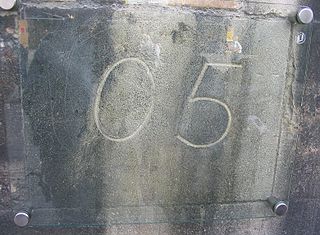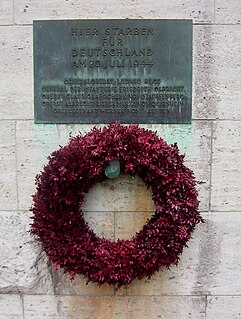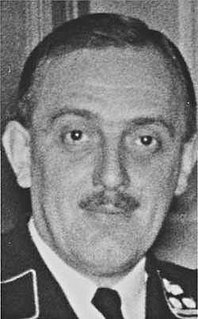Related Research Articles

The Geheime Staatspolizei, abbreviated Gestapo, was the official secret police of Nazi Germany and German-occupied Europe.

The Vienna Philharmonic, founded in 1842, is an orchestra considered to be one of the finest in the world.

Walter Friedrich Schellenberg was a German SS functionary during the Nazi era. He rose through the ranks of the SS, becoming one of the highest ranking men in the Sicherheitsdienst (SD) and eventually assumed the position as head of foreign intelligence for Nazi Germany following the abolition of the Abwehr in 1944.

The Red Orchestra, or the Red Chapel as it was known in Germany, was the name given by the Gestapo to anti-Nazi resistance workers during World War II. These included friends of Harro Schulze-Boysen and Arvid Harnack in Berlin, as well as groups working independently of these intelligence groups, working in Paris and Brussels, that were built up on behalf of Leopold Trepper on behalf of the Soviet Main Directorate of State Security (GRU). Contrary to legend, the Red Orchestra was neither directed by Soviet communists nor under a single leadership but a network of groups and individuals, often operating independently. To date, about 400 members are known by name. They printed illegal leaflets hoping to incite civil disobedience, helped Jews and opposition escape the regime, documented the crimes of the Nazi regime and forwarded military intelligence to the Allies. To this day, the public perception of the "Red Orchestra" is characterized by the transfigurations of the post-war years and the Cold War.

The Austrian resistance launched in response to the rise in fascism across Europe and, more specifically, to the Anschluss in 1938 and resulting occupation of Austria by Germany. An estimated 100,000 people were reported to have participated in this resistance with thousands subsequently imprisoned or executed for their anti-Nazi activities.
The Solf Circle was an informal gathering of German intellectuals involved in the resistance against Nazi Germany. Most members were arrested and executed after attending a tea party in Berlin September 10, 1943 at the residence of Elisabeth von Thadden. The group's downfall also ultimately led to the demise of the Abwehr in February 1944.

Confessions of a Nazi Spy is a 1939 American spy thriller film and the first blatantly anti-Nazi film produced by a major Hollywood studio. The film stars Edward G. Robinson, Francis Lederer, George Sanders, Paul Lukas, and a large cast of German actors, including some who had emigrated from their country after the rise of Adolf Hitler. Many of the German actors, who appeared in the film, changed their names for fear of reprisals against relatives still living in Germany.

German resistance to Nazism was the opposition by individuals and groups in Germany to the Nazi regime between 1933 and 1945. Some of these engaged in active resistance with plans to remove Adolf Hitler from power by assassination and overthrow his regime.

Heinrich Maier, DDr., born February 16, 1908 in Großweikersdorf, was executed on March 22, 1945 as the last victim of Hitler's régime in Vienna.
Horst Gustav Friedrich von Pflugk-Harttung (1889–1967) was a German intelligence officer and spy for Nazi Germany.
Events in the year 1919 in Germany.

Franz Josef Huber was an SS functionary who was a police and security service official in both the Weimar Republic and Nazi Germany. Huber joined the Nazi Party in 1937 and worked closely with Gestapo chief Heinrich Müller. After the annexation of Austria in 1938, Huber was posted to Vienna, where he was appointed chief of the Security Police (SiPo) and Gestapo for Vienna, the "Lower Danube" and "Upper Danube" regions. He was responsible for mass deportations of Jews from the area. After the war ended, Huber never served any prison time and died in Munich in 1975.

Eric Arthur Roberts was an MI5 agent during the Second World War under the alias Jack King. By posing as a Gestapo agent and infiltrating fascist groups in the UK, Roberts was able to prevent secret information finding its way to Germany. Roberts continued to work for the security services after the war, particularly in Vienna, but it was a time of great anxiety in the services because of the suspicions surrounding double agents such as the Cambridge spy ring.
Anna Hanika was an Austrian accounts clerk who became a resistance activist during the Nazi years.

Oscar Carl Pfaus was a German immigrant who became an American citizen through military service. He had a succession of jobs before becoming involved in pro-Nazi organizations in Chicago in the early 1930s and becoming a full-time Nazi propagandist there. He was also active in New York.

Susan Dorothea Mary Therese Hilton was a British radio broadcaster for the Nazi regime in Germany during the Second World War.
Countess Amethé Gwendolen Marion Mackenzie von Zeppelin, born Amethé Smeaton c. 1896, was a British woman who married into the Zeppelin family and was known as a translator of philosophical works from German to English. She also co-translated Werner Heisenberg's Die physic der Atomkerne into English in 1953.
The British Renegades Warning List was a list of people that the British security services suspected of assisting the Axis forces during the Second World War. It was sent to SHAEF on 6 May 1944 in advance of the Normandy landings on 6 June 1944 to enable Allied troops to identify people in occupied Europe who might try to subvert the invasion effort.
Lisa Louisa Elisabeth von Pott was an espionage agent, sculptor, secretary to the poet Rabindranath Tagore in the 1920s and 30s, and in 1928 the first instructor in sculpture at Kala Bhavana in Bengal. With the outbreak of the Second World War in 1939 she was interned in India as an enemy alien, and in 1940 repatriated to Austria.

Charles Frederick Watts was a member of the British Union of Fascists who was interned during the Second World War.
References
- 1 2 3 4 5 "re the "VON POTT" group", 22 January 1946, in Susan Dorothea Mary Therese HILTON, KV 2/423, National Archives. (subscription required)
- ↑ "re Susan HILTON" in Susan Dorothea Mary Therese HILTON, KV 2/423, National Archives. (subscription required)
| This Austrian biographical article is a stub. You can help Wikipedia by expanding it. |